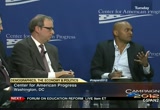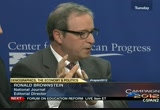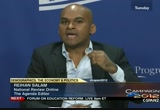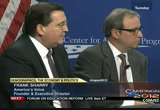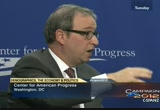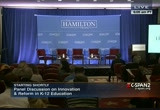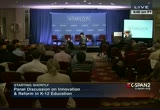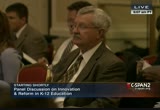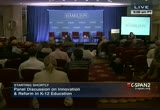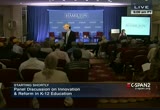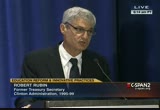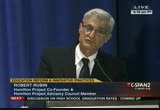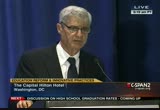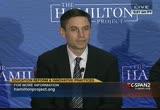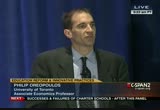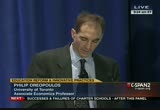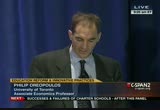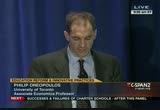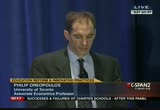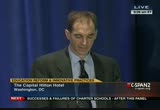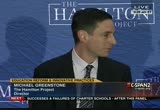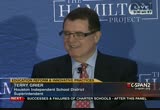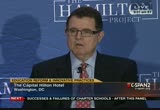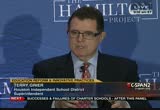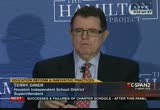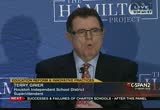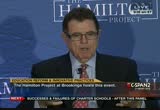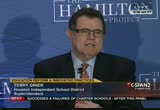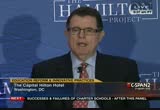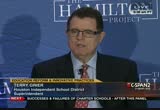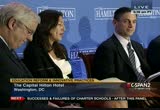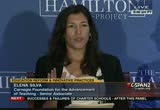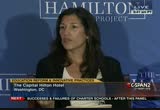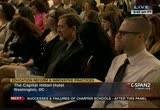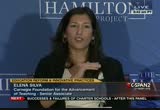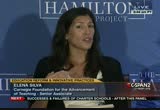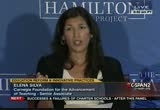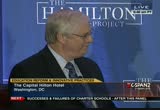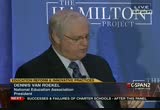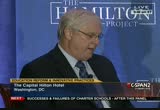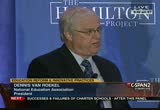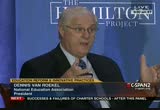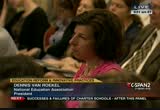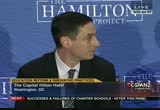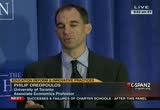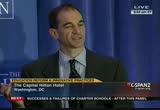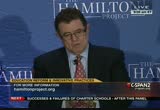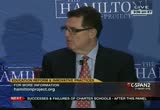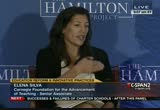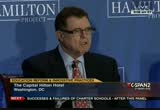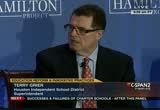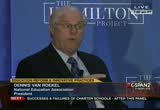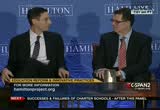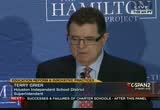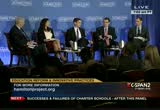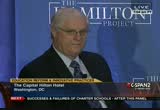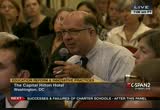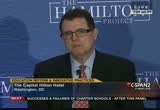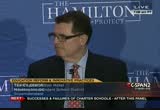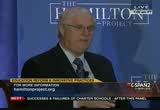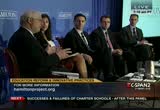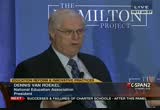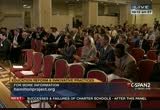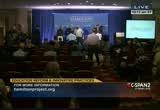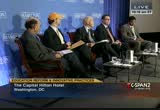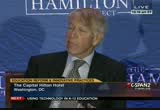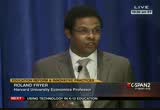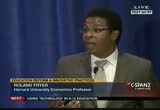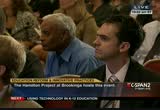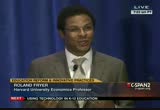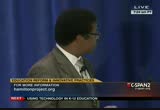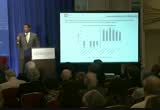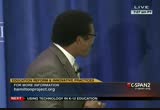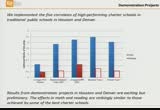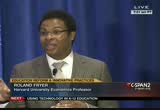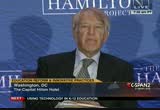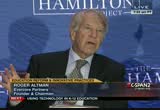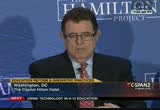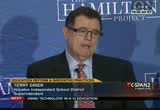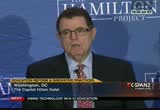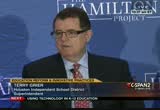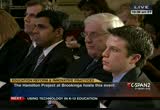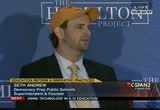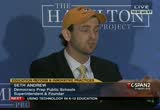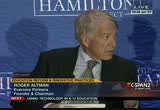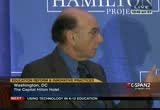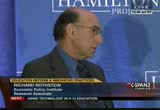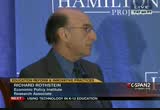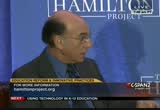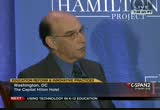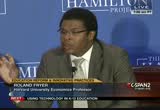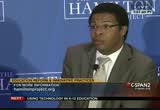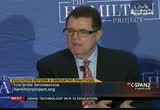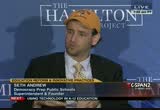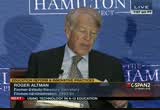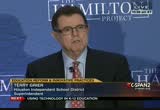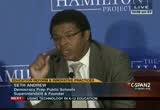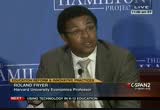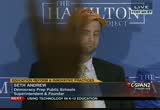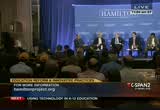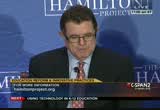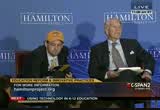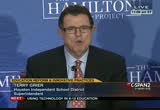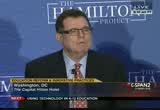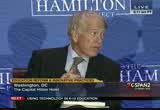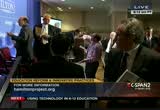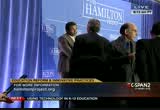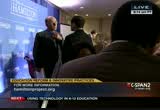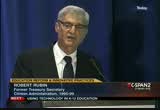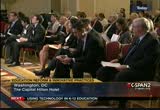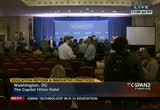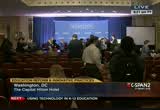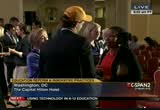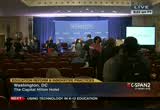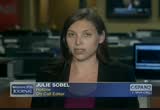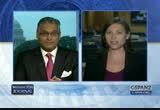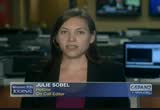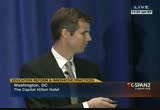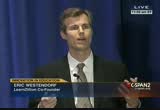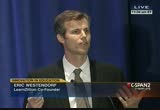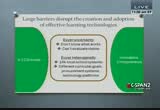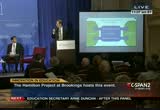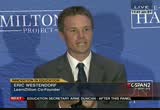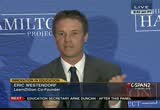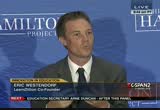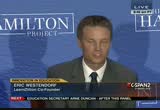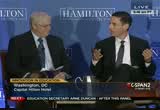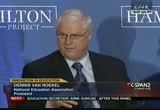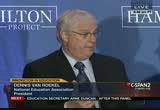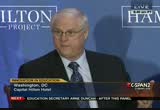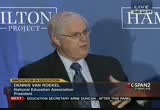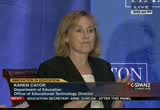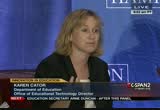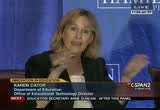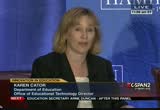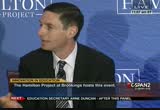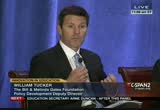tv U.S. Senate CSPAN September 27, 2012 9:00am-12:00pm EDT
9:00 am
strong candidates. i think a lot of conservatives think, and there's a very large number of very strong candidates. the real interesting question is what were the democratic primary look like partly because hillary clinton is a political figure and a figure who is not as intensely disliked by kind of less affluent republicans i think. she's someone with a very distinctive political identity. >> i think the basic question will be is there a voice that says the party has to change direction, try to reach a broader range of voters. particularly minority voters. and does that debate -- certainly there are no shortages of candidates. brian. christie i think is kind of the voice from the bleacher shtick did not scale up, and i think kind of ralph cram them kind of running for president didn't look as good in tampa. i think he would have to retool to be sure but i think daniels,
9:01 am
ryan, different ways, i think the bigger question is, is there something come is there a candidate to advance his agenda pushed analysis if romney loses. it's not guaranteed romney will lose. obama after three great weeks is at 50 so it's not like he is at 54 with a big margin of error. that if romney doesn't lose, i think the big question will be is there someone who kind of challenges the party on issues, particularly with immigration and maybe a little bit on social issues. >> i think, i actually think that someone who explicitly makes the case would be worse -- look at a bob mcdonnell in virginia. he is someone who clearly was socially conservative, telegraph that very clear to his voters and the thought of him as reliable, and so he was able to go after suburban voters and what have you. but because you thought of him as reliable and say, he was able to frame things effectively. i think that's a better model.
9:02 am
compare a huntsman to george w. bush. >> and marco rubio. i can imagine jeb bush is being the intellectual leader, but not running himself, maybe trying to see a rubio was not message of anti-and i can't get but further in this direction. i can sort of imagine that scenario. >> far be it for me to predict what republicans are going to do. i thought they're going to pass immigration reform in 2000, but i think jeb bush is going, he's positioning himself. he went to tampa and said we are acting stupid on immigration. is going to write a book and immigration reform. i think he's positioning himself to be the guy who is very conservative, catholic, he's got a great education track record but i think is going to be well-positioned to be, if we're going to modernize someone we feel safer, he could be the guy.
9:03 am
>> one last word on the millennials since we did have that question. according to the data i missing, it doesn't look like obama shares the millennial vote, its operational shores -- is creeping up. he did win it 66-32 in 2008. he's not there yet, 34-point margin. the pupil had about a 30-point margin. that's getting close. 56% of what all is said and done he may be wind up with a bird outside margin among millennials, but just not as big as he had in 2008, and, of course, another related question is whether and to what extent these votes will turn out. in 2012. so keep in mind in 2008 it wasn't that astronomical. >> the racial mix. >> absolutely right. >> the white millennials are noticeably more liberal. >> he was at 55% among whites under 30. in our poll we have him down to
9:04 am
50. >> that's pretty good. but anyway, short answer is looking pretty good for obama, maybe not quite as good as 2012, and that's what we hold the elections. we will see how they vote. but i want to thank you all for turning out. i thought this was a great panel. we got a lot of good information. vote early and often. thank you. [applause] [inaudible conversations] >> live coverage on this thursday morning. the hamilton project at the brookings institution will host a discussion on new approaches
9:05 am
to improving america's education system. education professionals were present strategies to improve high school graduation rates. those rates, some successes and goes of charter schools. and promoted advance in technology improve k-12 education. education secretary arne duncan also expected to give closing remarks during the day. this is live coverage on c-span2. we expected to get underway shortly. [inaudible conversations]
9:08 am
>> [inaudible conversations] >> [inaudible conversations] >> once again, we are live at the brookings institution here in the nation's capital as the hamilton project is hosting a discussion on new approaches to improving america's education system. it is expected to last until about 1:00. it will include education secretary arne duncan who will give closing remarks.
9:09 am
9:10 am
>> [inaudible conversations] >> again, waiting for the start of this panel discussion on innovation and reform in k-12 education with remarks expected from education secretary arne duncan at the close. while we wait for this to get started, look at a "texas tribune" festival that happened recently. san antonio mayor julio castro and republican senate candidate ted cruz were some of the featured speakers. this will be the program that will start programming on our
9:11 am
companion network c-span starting at 10 eastern. we will give you a quick look. >> the question was not is it an unemployment rate to the 8.8.1 or 8.3. is it any job creation today better than it was when the president took office. spent and the answer is actually not. when you have the lowest rate of participate workforce in years, that's ambiguous. let me tell you what the most important number is 1.5. into three and half years of president obama's tenure, gdp growth has been 1.5% are historically for the last 70 years gdp growth has been 3.3%. so we have had nearly four years of growth less than half the historical average by contrast, in 1984 under ronald reagan gdp growth was 7.2%. these are abstract numbers. what does it mean when the economy is growing, when small businesses are prospering, they are creating new jobs, people are able to find work.
9:12 am
it creates opportunities for everyone. what we have, unfortunately, is small business after small business is facing crushing, uncertainty. i'll take the single biggest question you hear from business leaders is they don't know between obamnicare and dodd-frank, between the offshore drilling moratorium in texas. all of these policies are killing jobs, and what entrepreneurs expressed to me all over the state is the sense of great uncertainty of what are the federal rate it is going to do. the president keeps promising to raise everyone's taxes which is causing small businesses to keep capital on the sidelines and not deployed because they have so much uncertainty. >> i'm not sure the president promises to raise everyone's taxes. do you know what the gdp growth was in last year of the bush administration? >> i don't. >> i don't either but i will look at a. i hope you had an answer. [laughter]
9:13 am
>> let's compare job growth under president obama during these 30 months, and under bush. 4.6 million new private-sector jobs that have been created under this president is more than were created under george bush. you have a president here who basically inherited one of the worst economies that this country has ever seen. and, of course, what he going to do with the object? that object will fall and then you have to pick it up, and the rise back up will be a little slower, what you've seen that is in these 30 months, 4.6 million new jobs, he's already created more new jobs than george w. bush. this is a president that understands how to get the economy going. it's not where we want to be but this election really should be about oki, between the two candidates who actually has a plan for the future? because elections are always about the future. given his record, i have more confidence that president obama can get that done than governor
9:14 am
romney camp. >> and again that entire program will be featured this morning on c-span. we are live now at the brookings institution for the start of this conference on improving education in the nation's school systems. this began just a moment ago, and speaking now is former secretary robert rubin. >> but that we believe highly germane to the hardship so many americans that i just mentioned. we believe that the debate about choosing between current job creation and growth on the one hand, and deficit reduction on the other hand is a false choice. deficit reduction enacted now with enforceable limitation of limited period down the road would provide time, hopefully, for recovery to take gold and
9:15 am
could contribute significantly to that recovery by ginger in economic confidence and by creating a fiscal content that would allow a stimulus. more broadly, the hamilton project convenes to liberation of her aspects of our broader shorter-term duress, including stimulus and mortgage relief. but our primary focus continues to be long-term economic policy. turning to the longer-term, our country has enormous strengths, dynamic and entrepreneur culture or ask not your resource, rule of law, flexible labor and capital markets, and so much else. dust, -- that's there are immediate hardships to be addressed. we are well-positioned to succeed for the transforming global economy. however realizing that potential
9:16 am
requires sound fiscal conditions instead of the current unsustainable and dangers fiscal trajectory, strong public investment in areas critical to economic success, and reform in non-budgetary areas such as health care, energy, immigration, k-12 education, and so much else. there are, as you know, enormous policy differences in all of these areas, but substantively they could be bridged to move forward effectively in each area. however, that will only happen if our elected officials are in the final analysis committed to effective governance. and that means working across party lines, different opinions, to make lyrically tough decisions.
9:17 am
and that takes us to today's program. any strategy for the long-term success of the american economy must focus on k-12 education in today's highly competitive global economy. there's an enormous amount of activity, as all of you know, going on in that area. and with the purpose of contributing to that activity, the hamilton project has conducted two events on k-12 education with papers and panel discussions, and today is her third event. let me outline a program but first let me strongly recommend the paper that is in your folders entitled the dozen facts about k-12 education. paper presents interesting and in some cases unusual facts in ways that are particularly salient and then draws them together to provide special anti-bush useful insights.
9:18 am
we have with us a truly outstanding group of individua individuals, the moderator of each panel will introduce them, the authors and the panel is. we will not go into the resumes because they are in your materials. our first panel entitled "staying in school: a proposal to raise high school graduation rates" discusses a paper by phil oreopoulos, associate professor of economics, university of toronto. the moderator is michael greenstone, director of the hamilton project, and three professor of in financial economics, massachusetts institute of technology. our second panel entitled "learning from the successes and failures of charter schools" discusses a paper by roland fryer, robert m. baird professor of economics at harvard university. the moderator will be roger
9:19 am
altman, chairman of new visions for public schools and founder and chairman of evercore partners. the third panel entitled "harnessing technology to improve k-12 education" discusses a paper by aaron chatterji. associate professor at duke university. the moderator again will be michael greenstone. finally we are deeply honored to conclude our program with remarks like the honorable arne duncan, secretary of the u.s. department of education. he will make his remarks, and then he will entertain questions from the floor. this is a truly remarkable program that will give all of us the opportunity to listen to and engage with important thought
9:20 am
leaders in this absolutely critical area. for development elect rule concept for this area come and then to bring the program together, let me thank three people. michael greenstone, threats of the hamilton project, karen anderson, managing director of the hamilton project, and adam mooney, project and senior fellow brookings institute. let me also thank our enormously talented and hard-working staff, without which nothing that we do at the hamilton project would over. with that i thank you for being -- would occur. the pudding is yours. -- the podium is yours.
9:22 am
i think the reason we're here today is the history of america is really been one of having the k-12 system that is in been in the world. and i think enforcement over the last couple decades that seems to be true. there's a lot of statistics that one can use to demonstrate that. test scores have been flat for several decades. spending has been up. college completion rates, we used to be number one in the world. we are now number 16. high school completion rates have roughly been flat for 25 or 30 years. and i think the consequences of what has, the decline in the american education system are revealing themselves in our society. we see unacceptable levels of inequality, the decline in incomes for many american families, and that's why we're
9:23 am
here today. so we have a really fantastic panel. i'm going to introduce the discussants as soon as -- for now i thought it would just introduce phil oreopoulos who we are very fortunate to have. is a world expert on high school and college completion. teaches at the university of toronto and will tell us a little bit about his paper and his proposal. phil. >> thanks very much. i'm really delighted to be here. i'm glad to be a part of this, and i want to thank the hamilton project and michael greenstone, adam moving, and jeremy for helping out with this. and this paper report is joined with derek. we only have seven minutes so let me start right away. so, scoring in particular, the minimum amount of time required to spend in school before
9:24 am
legally required to leave, [inaudible] to use to disengage from attending school may affect be better off staying on. so here's some examples. from new jersey, a person who stops attending school at age 16 will always lack the skills in preparation to successfully complete -- compete in the workforce. from maryland, it's important for state laws to indicate that you shouldn't believe in school before they receive a high school diploma, and from president obama, when students are not allowed to drop out, they do better. so what's the evidence of this? these laws have been around for a long time. in fact, some of them have been around for more than 100 years. we can take advantage of that by looking at what happens, what's happened to individuals when these laws have changed. and many studies now has shown consistently and robustly and that when compulsory schooling
9:25 am
has been increased, we see that on average lifetime wealth has improved. and increasing compulsory school laws have been linked to many outcomes that we may be interested not just from an individual perspective, from a societal perspective as well. these include lower unemployment, lower crime, lower teenage pregnancy, better health, and more civic participation in terms of higher likelihood to vote and more neighborhood trust. high school dropouts increasingly struggle in the workforce. on average, annual earnings over their lifetime don't exceed more than $30,000. some states have responded in recent years by deciding to increase the school leaving age to 17 or 18. and we can again take advantage of these changes to see what has
9:26 am
happened. and again, consistent with previous studies, later socioeconomic outcomes have improved. high school completion rates have increased and even college enrollment has increased, perhaps because the path to college becomes easier once overcome the hurdle of high school graduation. the attainment impacts are moderate, in part because some of the law changes were not accompanied by resources to implement them. but for those affected, the increase in present the of lifetime earnings was, on average, about $100,000 easily offsetting the per pupil cost associate with more caseworkers and higher attendance. and that's not even taking into account the possibility of other benefits as well. >> so what might be going on here? if a teenager really doesn't want to go to school, why would managing him to do so make them better off? there are many reasons of course for dropping out but in general
9:27 am
it's helpful to think of data as a slow process of disengagement. that past studies i've mentioned so just this disengagement occurs to some expense of long-term benefits later on. and it may come as no apparent surprise that they -- especially when faced with immediate sacrifice for helping realize long-term and uncertain benefits. focusing on a current life of school may lead to missing out in rewards in the future. compulsory schooling laws provide also the opportunity and resources to address this engagement. the laws are not just about getting kids to school by imposing fines or penalties. when a child becomes true and under the men in school leaving age, the first step is often a principle or counselor contacting the child or parent to figure out solutions for increasing attendance. this report is based in large
9:28 am
part on the facts are high school dropouts pays enormous hardships in today's labor market by passing studies have shown that these students would benefit at least on average from continuing school. at the same time, administrators should try to address reasons for disengagement in the first place. we think policies to raise the school leaving age to 18 or allowing for some exceptions while developing programs to reengage at-risk youth will prove cost effective strategies and fostering improved lifetime career outcomes. some evidence-based strategies for addressing disengagement include coaching and guidance programs as addressed by disengagement early, combine academic curricula and build working spirit, and setting high expectations while providing coaching and tutoring for those who need it. we think the time is right% higher expectations for virtually all students to complete high school, and consider college giving high
9:29 am
returns for doing so, and crazily competitive labor market conditions. raising the school leaving age is a realistic policy for all states to consider. thank you. >> thank you, phil. okay, our first discuss and come we're very fortunate to have to my left, terry grier, he is almost an unparalleled set of experiences in the american school systems. i'm going to try to get this right. i'm missing at least in your superintendent of the gilbert county public schools -- >> queensboro north carolina for three years. >> and he went to san diego. he was there for 18 months. not that long. >> not that long. >> the whether there is very nice. then he went to houston's -- >> i've heard the weather is nice. >> so setting aside his strange weather preferences, i thought we might ask him to talk a little bit about his experiences, i believe in
9:30 am
gilbert i learned this morning you had the lowest dropout rate of any big city school system. one thing i want, i hope the whole panel will be able to address, so i have children, and you look at these numbers and they're just astonishing. you are going to earn $15 a year, and our when you're age 50 if you dropout from high school. that's if you were. there's a good chance we'll be unemployed. one at a 25 are incarcerated at why do people make these decisions and how did you get them to change them? >> it's very hard. when a child is such dropped out of school, it's a hard decision. some people think is easy. is one of the toughest decision the cable make in a lifetime. we do get to the point where they decided to give up, before jumping into saying a few things, it's about people. houston is about people. it's the greatest city in the country. my wife and i love living there. the weather does not equal that
9:31 am
of san diego but the people are fabulous. so interesting in houston in 2007 by dropout rate was 22.5%. today, it's 11.8% number. so we cut it in half. as we did in queensboro north carolina and as we were beginning to do in san diego. i think first of all it has to be a priority. by the part of education and the superintendent that those type of statistics simply can't stand. so to us it's a focus. to us we hold people accountable. we looked at it from a short-term and a long-term perspective. long-term we quickly realized the kids were dropping out of our high schools, regards of whether, in north korea, california or texas and simply of them could not read. they were reading two, three, four grade levels below.
9:32 am
all those school districts again here in houston this past year, all of our kindergarten, first and second grade teachers went through a five day reading program training. so we trained them how to teach disenfranchised kids how to read. it's a different skill set if you try to teach a child who shows up in can a garden with a five, 7000 vocabulary who understands colors and shapes. first a child come into canada with a 1500, 2000 word understand with no books in home, not much reading going on. and are colleges and universities simply are not preparing young teachers to address that particular problem. so that was the big issue with us long-term. we got into our middle schools and we quickly recognized that students that had been retained two or more times, the chances of graduating from high school which is almost nonexistent. so we went back into a deep dive look into when children were
9:33 am
being retained. and what we've done with those kids prior to holding them back a year. that was quite revealing. then at the high school level when they got into high school, we established dropout intervention to teams at each one of our high schools and each time a child dropped out of high school that group met the same day or the next day and started looking at why that child dropped out and start developing and identifying patterns, patterns for us. we established in each one of the school systems were i worked, twilight high schools. in houston we have six. is your high schools that start at 4:00 in the afternoon, go to 7:30 p.m. monday through thursday and in albany on saturday. so students that have to work to earn income from their family, or kids who just want -- kids who are one or two courses sure can come back to the school in the evening and get credit to graduate to each one of our high schools, we started this in gilbert county back in 2001, we
9:34 am
have carried it all the way through california in san diego and out in houston. we established dropout intervention courses in our high schools, we call them grab labs. the school district purchase a laptop computer for each high school. we handpicked a graduation coach, and kids who failed courses before versus having to sit in a classroom and repeat the same thing over for 180 days, the same teacher who failed in the first time in could actually go online and could do credit recovery online. and last in houston we recovered over 9000 loss course credit. the software program is accredited by the western association of colleges and schools, and we are pleased with it. we begin each one of our school years after the first 10 years of school on a saturday, we do a big walk dropout recovery program. decades of dropped out of our schools and not return, we actually go door to door and
9:35 am
knock on doors and ask is why are you not in school? what can we do to get you back in school? and this past year during my tour, we knocked on six doors, one kid was absent. the five students we talked to, first of all if you can see the level of poverty the living, it would shock you. the second thing that we learned is that many of the kids only need a credit to graduate from high school. many had passed all their exams. they just were tired and they didn't want to go back to a traditional school day where they had to sit for seven periods and sit there all day long and take six courses they didn't need. they were usually older, embarrassed. what's fascinating about it in most states, the kids, if they come back to school for just one-third or two grades, school systems do not get state funding for those kids. so it's an extra cost. so a lot of states don't really put a lot of emphasis on trying to get those kids back.
9:36 am
our place, we don't care that it costs extra. as a matter of fact, we tell the kid you don't have to come and stay all day. you can come and stay one for you. we will work with your schedule so you can be here for the first period or you can be of the last third or you can come have lunch with us and go to school the period before, the period after lunch. finally, what we're doing in houston, and i can talk about this all day because we're doing so many different things, but the things where doing our strategic. they are well thought out. there are strategies that build on each other. the are not just shots in the dark. we know there is no one silver bullet to address this issue. but one of the things we have done in six of our high schools this high schools this year, we started a pilot program where we work with the u.s. euro of labor statistics, and we identified locations, applications in houston area, jobs that are going to be there 15, 20 years from now that require at least a two-year associate degree. we talk about student engagement, giving kids a reason
9:37 am
to stay in school. jobs like x-ray technician, logistics attack. and so in recent schools would associate this year a pilot, 50 different slots for kids. south 10th grade would compete with those 50 slots to be a pharmacy tech at the particular high school. of the kids that were selected, some between 10th and 11th grade because there were two sessions summer school, a double session, and the courses they take are blended learning online courses through the community college. we hire a teacher who teaches an interesting. and those particular students, when they get into the 11th grade, have their courses taught by our teachers and have for online courses through the community college but another double session summer school between grades 11 and 12, 12 great again half and half taught by our professors, our teachers, and half by the community college professors. then the year they graduate from high school they come back to
9:38 am
school, and another double session summer. they have completed two year associates degree at no cost, and they have, their senior year engaged in mentorship and shadowing programs that our goal is to have them all job opportunities when they leave high schools. we are in, been in school 25 days, the attendance of the students in the program so far has just been phenomenal and is just absolutely been phenomenal. the last thing, we'll talk about this on another, we've been engaged in this program with harvard to turn around our 20 lowest performance goals because when you look at where kids drop out of school, you do find that you have middle schools and high schools, and yes some elementary schools where you have a higher percentage of kids leaving those schools than you do other school to a lot of that comes back to having a quality teacher in every classroom. and that is a huge, huge goal of
9:39 am
our board of education. our board is so serious about this issue that i can tell you how proud i am of them for their willingness to let us engage in some pretty courageous approach is. >> thank you. it sounds like you guys have a lot of innovative ideas. so, our next start discussing is elena silva. when we talk briefly before, this morning i was reminded, i assume this is been attributed every single american president, but the one i've heard that about is andrew jackson when told that the supreme court had issued some law or rule, said welcome why don't you tell the supreme court to come down here and enforce. and i believe your view on compulsory schooling laws might have something to do with that but i will let you speak for yourself. >> sure. let me begin by saying phil, i
9:40 am
enjoyed your paper. it's a fantastic analysis. and there are sort pieces of it that i very much support. i also think it's the right problem. this is certainly the right problem to be tackling. we can't have a third of our nations children dropping out, and we know what happens if you drop out, youend up in low-wage inconsistent work or no work at all. so again this is the right thing to tackle. and it makes sense to target the problem or target a solution where we think oil when we see it happening. so we see 15-18-year-olds dropping out of school and we want to stop the. we want to stem the tide. but we need to consider the root of the problem. so let's consider that problem for them and. they're all of a lot of reasons why kids drop out. but the typical dropout actually is more predictable than perhaps one thought it was. we know these dropouts, you picture, imagine a kindergartner, i have one at home, super excited about school, loves school, really eager.
9:41 am
third grader, by third grade you've got the student, i have one of those, too, who at this point in reading, maybe starting to get engaged, or maybe starting to get disengaged. at this point as you move forward you start to see kids are going to drop out, it's pretty clear who they are. and there's a lot of research to back this up. by middle school these kids are pretty disengaged. they are not showing up for the classes. by high school, let's say by ninth grade they fail in english class or the failed a math class. those kids are going to drop out. we know that those are the dropouts, and so the question here is where that problem really starts. and the research, so johns hopkins, for example, bob and many lectures and other colleagues have done quite a bit of research that shows exactly how we can track, notice and track these indicators. the abcs, attendance, behavior, course completion and course progress, those are the
9:42 am
three things that you look at to find out if a kid is going to drop out. and we can do this as early as middle school. if one of those indicators is off track by the time a kid is in sixth grade, the chances that that child will graduate plummets. which means all of that is to say that we can know, we can identify and we can do something about the dropout track. and there's been a lot of good work after. many of the programs that terry reference, there are ways to prevent dropouts but there are ways to identify these kids early. there's a recent research paper out by donald hernandez i believe it is at hunter college that tracks, tracks graduation all the way back to third grade. if you're not reading proficiently i third grade your chances of graduation drops. if we know that we should start charging it there. we should be putting our efforts there. we should be focused on how to make sure that the kids at the
9:43 am
earliest ages, we can identify with any applicant target interventions that work for those kids. the strength of this proposal is that it recognizes that. if you read it carefully, and i encourage everyone to read, it does combine both this raising of age requirement with a lot of support. might issue primarily with that is that the focus on requireme requirement, which is in turn about enforcement, is about changing behavior through a mandate. i mean, that's not primarily the way behavior changes. i'm a sociologist by background so we differ a little bit out the way the comment is, but behavior, particularly with disengaged youth, doesn't change because you require them to do something. i imagine that there are some students and there's some evidence to support this that would feel that pressure, and my stay on longer because they feel
9:44 am
that pressure. although developmentally related you get in those years the less likely it is they're going to respond actually to the pressure. but even if there are some students who respond to the pressure, high in large i think we would see higher rates of noncompliance, that it wouldn't really change student behavior, that we wouldn't really see states enforce it at that point. we are not really going to see states find families and fine, give fines, and if they did i do think it would be effective. so it's not actually the idea that kids should graduate from high school that i would take issue with. i think the federal government should send a very strong signal every single state, every single district, every single school should send a strong signal that graduation from high school graduation is necessary. it's the minimum, and we should send that signal in a lot of different ways. but we've seen a lot of states try to do this, try to raise and focus on compulsory age
9:45 am
requirement to a lot of them haven't gotten there. it's politically difficult to do. it's practically difficult to do. and my biggest concern is just that with other places where we could be focusing our energies. there are ways to prevent dropouts. we know what those are, and those ways actually improve the quality of education, the quality of construction but it changes what happens inside schools. it's not about the outside requirement. u.
9:46 am
where we can provide education in the wildest places and formats that will engage kids. those are the things we should be focusing on. thank you. we are fortunate to have the president of the national education association, van roekel, representing three million schools in america. previous to that he was a teacher for 23 years of mathematics. i wonder if you could talk about a bunch of new students staying in school longer. is it more teachers?
9:47 am
if students who are less excited about school might affect the dynamics of teaching. >> thank you for the opportunity to be here. has a 23 year math teacher this is a fun topic to be talking about. the point about the report i thought was excellent and the first point i make is we long supported the compulsory age to 18. they said it so well it is not more of the same. the solution is only to do the same thing longer we would have done that a long time ago and the idea you have to do something differently to impact kids and keep them in school and have success is an important point. the important talk about raising national expectation that everyone has to ha at least a high school diploma is important. you can't mandate that but by behaviors and actions you can create that kind of atmosphere.
9:48 am
it isn't just one policy change. second aspect of the report that is so critical, brings out the benefits so outweigh the costs. education -- we talk about cost of education. it is and a cost to me again. it is an investment. look at the economic studies that show the difference in earnings. is evident the investment in having a well educated work force really pays off in the long run. that is so critical to start from the premise. we know it costs money but it is an investment -- better than any investment of tax dollars. about impacting teachers, if you put those kids who wanted to drop out in my class let that be a problem.
9:49 am
if you create an environment where they want to be, education nation, i saw a video, massachusetts and it is unbelievable. 24 different career choices and veterinarian clinic. 16 day auto shop. the list goes on but it is different. not more of the same. there's one thing in the report that i think although it wasn't the focus is so important and it was mentioned by both analysts, the early intervention. i am a believer in systems. you can't take a piece of a whole system. even change dramatically one piece and assume the whole thing will change. i don't believe that is true.
9:50 am
the thing about public education in america that is troubling to me is when they say no system can produce anything other than what it was designed to produce. in this country when we graduate 75% of the kids year after year after year unless you are african-american or hispanic is closer to 50% as the report points out the rate doesn't fluctuate like the dow jones average. it is constant because the system was designed to do that. what we have to do is talk about what changes in the system have to occur so that we get different results and early intervention is the key. nobody did anything wrong. there is no one to blame. was a different time. they needed everyone to have a basic education. some tab have more and a small group to go to college and get a
9:51 am
well developed education. it worked unbelievably well. in the twenty-first century i don't believe that purpose of education remains the same. we can't just educate basics for all and some get more. we have to provide much more for all. how do you change that system? how do you do the intervention because it is so true? they even high school but dropped out long before that. when i taught freshman general lack, they are worlds apart because if you are a freshman in high school and still not even in an algebra the reason you are there is not because of math but because you have not been successful in math. the idea that i was going to do something so remarkable that it is going to erase all your history and now i will do well
9:52 am
in math is crazy. what you need to do is focus on that students who creates the connection between where they would like to be and what i am teaching. if i do that the that is easy so i think the additional policy is the answer. there's no research that exists that doesn't tell you that is the answer. there is no class in school from k-fault that has a greater range of ability than kindergarten. the further they go the classes get more homogeneous. we have got to provide that for early childhood and as we look at the range of public policy that is what we need to focus on. >> thank you. i would like to have a chance -- i thought you might talk a little bit about the historical evidence that you are drawing on and that is relevant to the
9:53 am
benefit cost analysis. >> i want to thank the panelists. a great privilege to interact. they were very good points. it is clear from my paper that i don't view mechanisms only through simply sending a letter saying we are going to talk to you if your kid has not been to school we will send you to prison. the issue is about addressing engagement and when we see chronic absenteeism it is a schooling issue. not just about never showing that to school but not attending or showing up on that day. what the laws provide is a mandate for addressing
9:54 am
engagements whether it is through -- provides the opportunity for schools to realize we have a problem here. not just we care about this but also have legislation to care about this as well and one reason why we observe above 16 not only did we see high school completion rate increase but the number of people dropping out at early ages decrease and i think it was because when these policies became more restrictive they simultaneously also increased awareness to addressing agent and i think the ways to address this engagement there are many ways and it has to start early. that doesn't mean there's no
9:55 am
hope for a dressing disengagement starting late. in another series of studies, providing some assistance and filling out college application form is enough to make the difference between many people going to college or not. there are opportunities for not just even at later stages which can make a difference even for these older kids. at the same time it doesn't mean we don't address early disengagement but address both. that is the point i want. >> they already have -- is it relevant in the way you run the district? >> texas is 16 -- i wish it were 18. i am a proponent of having a good hire graduation -- higher
9:56 am
graduation standards. certainly engagement is the key. we saw this in education what the problem is. we need to talk about the solution. we don't have more people that are passionate. this ought to be national imperative for all of us. to really address it with vigor. there is a hard piece in the end. we have the dropout rate to 11%. the hanging fruit is gone. now the hard work is in front of us and to me having a 18 year compulsory attendance would help me get that 11.5% down to 10 it is worth it. how are we going to enforce it? how do we enforce it now? we have kids that drop out of
9:57 am
school before they are 16. see where they are and try to enforce that as we have that as an issue too. it is hard to enforce the 16 years and one more tool in the tool kit that is worth another 1% or 2% is well worth it. >> i would disagree with that. policy as we all know is about making choices. about the policy that will have the greatest impact on a problem we all agree needs to be solved. my sense is a lot of interventions use folk of our where the policy should hit. if we focus instead on the compulsory age, there are a lot of ways to send a signal. it is not politically easy to pass this. this isn't an easy slam dunk. if that is the case we are going to focus our efforts and
9:58 am
attention on raising the compulsory age. it is the wrong place to focus. it sends a message that high school graduation is important but also that the payment of that certification, of graduation's so we need to ask what that means. is graduation's the right measure? your point about sixteen-year-olds there are plenty of 18-year-olds who graduate who employers are not pleased with. they don't have skills they need or quality education. they are unprepared. if they focus on anything it needs to be insuring they are actually learning. that is why our nation -- this is what we are in a cage in this process to try to have improved standards to do that.
9:59 am
>> you said something -- we have all over houston and america that are hiring these kids, we want kids with higher skills sets. i promise you in houston, texas if i could have every employer -- we will send them to a twilight school or we won't pay you. we won't higher you. when you start talking it is hard to pass legislation it is hard to pass legislation because you have lobbyists in the labor group around the country lobbying against this because they want these kids to be able to do some hard work. i remember at a much younger age in a small school district when i was a superintendent and we were attacking this issue, a leading citizen came to see me and said you are working too
10:00 am
hard on this dropout issue. i said what do you mean? he said if you keep these kids in school and convince them they can go to college who is going to work in our pulp wood factories? this is a different state with a different time but this has to be something you can't just sit around and say is important. this has to be important to america. it has to be important to our employers. once we get everybody together on a team we will tackle this with much more -- with students i never try to establish graduation was the end in sight. it was the means. is not an end. i used to say to my students what would you like to achieve? i want and a. that is it? your life would be completed by
10:01 am
god and a? -- complete if you got an a? it is where you go. i could tell you how to get you there. as much as we support -- they get more of what they need to go where they want to go. we just can't make it sound like if you complete that you are done. you got a high school diploma. is always about your means of getting somewhere. as the more we can establish that and instill that in kids' education as a means, not an end, began. >> people want to ask a question. might i make a suggestion? you have 11.5% and have to be one of the leading reform superintendents in this country. i can guarantee you in a series
10:02 am
of education researchers, figure out what works and what doesn't, everyone would have the benefit of knowing that. >> we are willing to do that and we have been doing that. it is covering. the only thing we have done this year is we have a new teacher and principal evaluation instruments in houston and they both awaited heavily towards student performance and the principal evaluation includes component of student dropout. at the elementary level it can take a component on kids leading at grade level. focusing and being strategic, the research most of us know is tough hard work but a lot of it is political will. a lot of it is working in education environment in public
10:03 am
schools so you have a board of education and this is a huge barge. when i went to work in gifford county board handed me the job. what is the big priority. they basically said dropout prevention. i said what percentage of your budget is committed to addressing that issue? short-term or long-term like we were talking about? it was hard to find. this is a big issue for all of us. we must align our resources to address this problem. at the early age with intervention attendance we know in our schools we have problems with attendance. how many programs do you have where you have these constant problems? we all know if you have a first language, each semester in kindergarten and first and second grade, you get 38 percentage difference in your
10:04 am
reading scores. how much education are we doing with latino parents to make sure they understand the importance of their children being in school every day and a young age? we know how these things -- what we do maybe a bigger issue than we are willing to admit. >> we have time for a couple questions from the floor. we will have the microphone in a second. >> i am john do we educated. two -- my godfather and my mother's mentor. that gives meaning. i have a question that is multifaceted. you are absolutely right. it is about system is. there's not one thing you can do but kids need to learn system
10:05 am
process, context and consequences. i can't find that in any program. i watch it at an adult level and see why people make terrible mistakes. texas -- i was looking at this 20 years ago -- controls content of the schoolbooks. if you could start rethinking what would be put in the curriculum which could get them to think about problem solving a friend of mine talking about writing kids books for young kids where they have part of the answer to start with breakfast and a peach and a bowl of cereal and where does this come from? my mother knows. where did she get it? you have to build up. you have to make learning an exciting discovery adventure. i don't think that is being
10:06 am
done. >> thank you. who do we have next? in the short period of time the more you can direct the question the better. >> population focused in parenting and drop out large problem for them. i wanted to hear your panelists's view going the opposite direction. i was at a session of few days ago where they were talking about -- in texas where there is a state why that permits funding of using high school funding -- don't know the details -- up through age 26. honoring the k-12 system funding potentially should be made available for older students. i am curious if that is not another way to think of this
10:07 am
rather than trying to get to 18 as compulsory but maybe about using elementary and secondary education funding for older students. >> if a student 21, 19 or 18. it we don't engaged but if they have one or two courses to be completed we do credit recovery in those high school and receive their diplomass and we are happy to do that. give me the choice between having free k and moving money towards the 25-26-year-old kids or adults i will take a pre-k every day. texas last year in budget cuts eliminated funding for all they prekindergarten programs. the board of education we decided to take money off of the top and fund called a free k across the district.
10:08 am
that reduce titled 1 funding for high school and middle school but we thought it was the thing to do. >> questions here? >> my name is amy and the work on capitol hill. i watch the documentary tuesday which was fascinating and scary but great. i saw a lot of adults making significant efforts to intervene children's lives. how do you prevent burnout for people who are doing incredible things? they were doing a significant amount of work to make things happen to kids but i am not sure we can sustain that. >> this kind of work, anyone who does this work burns out. you need to develop networks where people know each other and care about each other as people and spend time talking and reinforcing each other but that
10:09 am
won't occur. >> another aspect is you expect all the things that child needs to be provided and sometimes the teacher. my first year of teaching i went to my home town doctor and thought i was developing an ulcer because what i was doing was internalizing every problem a student had and taking it on. you have to learn not to do that or you can survive but when you talk about intervention programs like an after-school program it need not be the people who talk all day long and do an intervention after-school and evening work. you can't do that if you have family and your own children. we have to devise a system that honors people and the work they do but don't expect them to do something that is not sustainable. i don't think the solution is a system that brings people out and we replace them. the solution is to create a system that allows people to have that passion and commitment
10:10 am
and do their work and that it is not the only thing they do in their life. no one can say that. >> to reiterate the early intervention early indicator early identification intervention is the problem is it builds. the problem has been building and building so anybody trying to help these kids is dealing with a host of problems that might not have built to that point if we started a little earlier. >> the health program we will from harvard. those 20 schools together collectively came up with a mantra study and across the district and goes together we can which gets to this burnout issue or whatever it takes and no excuses and put all three of those together and it is powerful whether talking about intervention or talking about long-range strategies. >> early intervention.
10:11 am
i hate to use automobiles in comparison to kids in school but when we started in this country we were behind in the quality race, we found outside the assembly line there were parking lots where all of the cars coming off the assembly line that weren't right and needed to be fixed. we went to japan and other countries that started this quality movement sooner if they didn't have a parking lot. they go we don't have one. what do if the cars that come off of the line are right? we stop the airline when there is something wrong. the focus was as you move you take care of those situations so workers shut down the assembly line because the car we are working on something wasn't right. adapt that to the concept of education and early intervention. don't wait until there are 15
10:12 am
and 16 and dropping out of school creating incredible programs to try to bring them back and get them back on track. the systems that are successful in finland when i visited if a child is having trouble they have an intervention. they have a team meeting and determine if the child needs a small group or small group of adults who work with them or they need one on one of the deal with it right now and that deals not only with intervention but the burnout issue because you are dealing with issues as they come up. better solutions. >> we are out of time. fortunate that four people here focus on what has to be one of the nation's most important problems. 20% of kids don't finish high school as much as half. join me in thanking these experts. [applause]
10:16 am
[inaudible conversations] >> okay. this panel is going to discuss one of the biggest and one of the hottest issues in education policy today. has roland prior's paper points out and i urge everyone to read it if you haven't had a chance to do so. it is quite important. and excellent. it points out charters are the most important innovation in public education over the past generation in the united states. there are many myths and many
10:17 am
misconceptions about charters and about the motivations and goals of many in the charter movement. you saw some of that play out in the chicago teachers strike. beyond that there are many people in the united states who think charters are an unmitigated good or alternatively an existential threat. the reality is they are neither of those. we are exceedingly fortunate to have roland prior with us today. i will introduce roland before i introduce the rest of the panel after he finishes. the project has done considerable work with roland.
10:18 am
we are fortunate to have been able to do that. he has prepared an extraordinary paper which he is going to summarize. i would say roland's resume is a little hard to read. you would think it must be fake or something. how could anybody have done so much so quickly? i particularly want to know what a titanium lion is but i won't blanc that year. he is doing extraordinarily important and vital and groundbreaking work. if we are going to ever turnaround the decline in median income in this country and get back to raising living standards for america we are only going to do that by lifting up and truly
10:19 am
changing public education in this country. that is the only way that will ever be achieved. let me introduce roland. he is going to summarize his paper. he will do 34 slides in seven minutes. i think he could take a little more than that but we are happy to have you. >> thank you very much. it is good to be here and to see so many familiar faces in the audience and on the panel. michael greenstone e-mailed me this morning and asked me to speak for an hour. i don't think i should do that. there we go. let's start -- i got it. good morning.
10:20 am
so, how have you been? we all know education in america, the statistics show are performances flat in the last 30 to 40 years and if you look at the latest statistics of how many schools is 48% of schools didn't make a wide feet in 2011. if you look a national association progress is shows roughly 40% of our eighth graders are proficient in math or in reading. one thing that is most disturbing to me is of all school districts that participate in nato, there -- p --nape not 1% of black or hispanic students are proficient in math or reading and in places like detroit roughly 3% are proficient. i tried to calculate how many kids that might be. it is roughly 132 that are
10:21 am
proficient in math in a place like detroit. over the past few years we have -- i have tried to figure out through lots of failures and a tiny bit of progress what we can actually do about those facts. two years ago i stumbled on the work of the harlem children and we did an evaluation. i was pretty blown away to see that after four years his students who were lotteryed in, good for them after four years he had to raise the achievement gap in math between the average black students who applied for the lottery and the average white students in all of new york city and cutting the third the gap in english-language arts. i thought that was real progress and i wanted to understand how we could do that for all kids.
10:22 am
we went and it reminds me of my grandmother's baking time. i am sure you could say i am certain you have nothing on my grandmother. i needed to say that on c-span just because she is watching. my grandmother is an absolutely fabulous quote and one christmas i was alone in cambridge and i want to make my grandmother's cocoanut cake as well. she has been an educator for 30 years and my great aunt was an educator for 51 years and i called my grandmother and said i want to make your cake. release simple. you start with two cups of sugar and boil. come again? she gave me a direction that sounded like people who run great charters when you ask how they run their schools. what cup? around thanksgiving i went to my
10:23 am
grandmother's horse and annoyed her in the kitchen and she would grab flour with her hand and i would put a cap underneath and sprinkle the flour in. we tried to do that with charter schools. the average charter school is better than the traditional public schools. is an important fact. what is interesting about charters is there's a huge right tale of charter schools that are doing phenomenal things with kids. just phenomenal things. there's a left tale of that distribution that if i worked with you on would shut them down this morning. they are not doing good things at all. for kids. as an economist what we want to do like my grandmother's recipe is distribution, these people are free to make choices.
10:24 am
no one remembers the second promise was to be an incubator for best practices that could be used in public schools. we took this freedom and this variance in the outcome and we really wanted to understand what makes something good and others not so good and we found five things explain 50% of variance and what makes some showers schools good and others not so good. 50% of the various. some may be saying the are at harvard you can always claim 50%. others may be saying if i could explain 50% of daily variations we could own a few islands. i was buying up here. so we use this data to come up with facts. i will save them and i don't want you to leave the room. bear with me.
10:25 am
this is all off. okay. it is like a cruise ship. i am several moves behind. i don't want you to leave the room when i say them but the first one is how often schools give teachers feedback. feedback on their instructional practice. the second one is how they use data to drive and alter the pace and scope of instruction. we talk about data in schooling and education reform. so much fade it might be a liability more than an asset in some schools. i am sick of data walls at this point. what is interesting about the effective schools is they not only place plaster on the wall so visitors can see that you can talk to teachers and they know how to alter lesson plans and construction as a function of information they were getting.
10:26 am
the third thing is how they broke students into small groups like six or less for four days a year. the fourth thing was instructional time and the fifth thing was high expectation and no excuses. high expectations are very important. one tiny story. when i was 15 and went to high school my father had just gone to prison over the weekend, been convicted over the weekend and i went to school monday like it was a regular monday. not trying to be funny or flippant but in my neighborhood one guy went in -- not that big of a deal. i went to school and my guidance counselor who was the most well-meaning guy around came up to me and had these sad eyes and he said i saw what was in the newspaper and we think this is awful. i said it is not so bad.
10:27 am
they said we were thinking given the extraordinary circumstances you shouldn't have to come to school all day. i said it was kind of bad. [laughter] we have a new program. you can go home at noon. i said it is so bad i was thinking 10:30. high expectations. if you talk to the leaders of effective schools the kids will live up or down to whatever expectations we have. we looked around for someone willing to let us implement these five things. it was very difficult. difficult stuff to do. and then i ran into terry grier. i was going to get married two years ago. at imac terry grier.
10:28 am
we are still heading theing. we implemented these met terry. we are still heading theing. we implemented these tenants. the lowest performing schools -- i will show you the results quickly. on a slide you have children results -- the reading results enough to reduce by a third. then add a fifth school by evaluation and accused and and -- houston and denver. how do you continue and scale it? i am sure will be beaten up in a second about what it shows is you can take these strategies, these basic strategies of
10:29 am
teacher feedback and professional development which i am a huge proponents of. implement them in traditional public schools where people cannot sign up for lotteries and you take the kids you get and shouldn't the tenants -- maybe i don't want to use that as an excuse. i tell folks parents are sending you the best kids they got and hiding of the good ones at home. that is just test scores. we are not interested in test scores and i am with you. we have just completed a bit of a longitudinal survey medium term outcome of kids who went through in 2004-2005. we spent $1 million tracking down 500 kids. these are other outcomes we are observing in the data from the
10:30 am
impact of attending this school. i want you to see denver and houston have similar results and we don't have medium term outcomes from houston or denver. too early. what you see is 80% increase in who took the s.a.t. or 16% increase being accepted to college and other outcomes are positive. i want to point to two of them which are both phenomenal and distressing at the same time. number one, pregnancy. we tracked it down. imagine this. april 14, 2005. kids sit in an auditorium in central harlem. half of the girls get a ticket to go to a high quality school. the other half the to whatever school they are going to go to. four years -- seven years later the ones who didn't go are five times more likely to be
10:31 am
pregnant. to the boys says that -- those that did not go are four times likely to be incarcerated. this is not just about test scores. i totally agree with folks who say high test scores for kids who are endangered or likely to be in prison not so interesting. kids who know the high factory in fear of are locked up and not interested in that. i am interested in these long-term outcome is. in the end these three pieces of evidence give me incredible optimism and concrete proposal for how i think we can move forward. is not perfect. we need a lot of work on reading. we think we are on the 40 yard line with 60 yards to go. we have three pieces of evidence. we have a sense what makes some schools effective and others not. we haven't figured out. 50%. second we know that if you take
10:32 am
these things there's nothing special about them being implemented in charter schools with traditional public schools to get similar results and third, those tests for results seem to be to better outcomes. the proposal on the table here is to take the bottom -- to implement these strategies and come together because those other kids who are most vulnerable. we can argue over the other 95% all day long and take 5% in the bottom to do these strategies to turn those kids around because there are three million kids in those schools. thank you. [applause] >> we are joined by terry grier and staff and crew who is the
10:33 am
founder of a successful democracy prep school in 2005 and has been a model and a research institute -- the policy institute and the warren school of policy and law at berkeley law school and published extensively. i will start with terry. one effective thing rowland said is the great promise of charter's is they provide us searching lessons as what works and rowland has identified five which can then be ideally employed in district schools or traditional public schools.
10:34 am
roland's paper says if you try -- if your goal -- in a charter school would take 100 years at the current rate. that is not a viable role. where does your experiment in houston go from here? what additional time is required in those 20 schools -- the points you just made and if they prove out -- what are the chances of doing it to extend the five practicees more widely. >> it is hard work. no question that it is hard work. in talking to jeff about his experiences in harlem is like after the third or fourth year he fired everybody and started
10:35 am
over again. this is hard work. you are talking a shift in culture and a major shift in expectation. these schools did not get this bad overnight. many of these schools were failing schools 12 years ago, 15 years ago and we didn't have political will to do things we are talking about doing here to change this. change in public education is tough. that is one of the reasons i think you don't see a lot of success in some of the charters. some of the charter is kept doing this same thing as people running them before they became charters and the effective charters you have innovative and creative leaders not keeping the status quo. in our school districts we're spending $2,000 more per student in these charter schools than we
10:36 am
do in our traditional schools. we added an hour to the school day. we have tutors who tutor all sixth and ninth graders in math 70 minutes a day. one 2 for two students. these kids go to school two weeks longer. it takes more money. what people think sometimes forget about public education is it can no longer be a one size fits all model. kids simply need more time and more help. one of the things we struggle with is if we turn around these schools be required teachers to reapply. we replaced all the principals and assistant principals. one big challenge is finding human capital, teachers who've and go in and teach these children and have high
10:37 am
expectations to differentiate learning to the degree that we need to in these schools. it is a big challenge for us and something that takes a lot of political will to do. i worry about finding enough of the talent we need long term. in denver rowland has an idea of starting a lot more tutoring. almost a tutoring school which is getting some interesting results and we want to find out more about vat as well. we in education have to get away from the idea that we -- i happen to think talking about this bottom 5% the bottom 15% in all states children should be funded at a much higher level and superintendents are accountable for how those dollars are spent making sure you get a good investment on
10:38 am
their return. one of our biggest criticisms people said to me how are you going to sustain this long term when this three your program is up? about $18 million through our school district foundation to fund this program. we spent local state dollars but the bulk of it has been money that has been raised. someone said to me it is not sustainable. the person who said it to me was one of the big financial supporters of our e effective charter schools in houston. i said tell me how long that charter network can be sustained if you didn't raise money? if you were not giving a million dollars to it and others were not giving money? how long could that schools be sustained without having to raise money? i am not critical of that. i think it is sad that he has to do that.
10:39 am
the children he is educating require more time and more assistance, more tutoring. they are doing a phenomenal job. one of the best charter networks if not the best in the country. why should he have -- to raise that kind of money to educate these children at the bottom? all of our children need quality education. some take more time and resources and more energy. >> seth, tell us about democracy purpose schools. how many there are and the mix between elementary and other levels? tell us a little bit about the last point terry was talking about which is important mainly costs, how much are you spending beyond what schools spend and how are you financing them? >> thank you for having me.
10:40 am
lawyer -- pleasure to be here. consistently the highest performing chartered network in new york city on the progress report which is a metric that looks at student growth over time which is one of the reasons dr. fryer's research is so powerful. callers get into the school by a random lottery so we are proud of the growth kids made but there a long way to go. our first kids have not graduated college. we are in the college class of 2018. that is a long time away. we have to measure the metrics rowland is talking about make sure this works long term and a lot of early indicators look at this and the research shows that. what we actually try to do between different what has been done before. i want to shift to the funding question. what we have done is take a great work that happened to
10:41 am
charter schools before us. to reiterate what rowland said charter schools suck. i want you to hear that from the guy who supports charter schools. and that is an important thing to know but that is not why we have public charter schools. public charter schools are the innovation laboratory for american public education to figure it out and even if we assume the study is right and 70% are equal to are working district's schools. dr. fryer's paper is powerful because it has the ability of scaled to impact the lives of three million kids we're talking about the day. the thing people say is the barrier and i will disagree with terry, is money. money is not the issue. anybody who believes thinking money is the issue is not listening carefully enough. democracy prep spends less than new york's public schools or charters of new york and once we
10:42 am
open from day one we don't need a single dollar of philanthropy to run our schools. i would argue one of the reasons we have done so well as my focus is not philanthropy. i don't raise money. i don't talk to anyone to raise money. i just go and focus on running the school. the talent problem is the problem. we don't have enough great leaders. we don't have the school leaders and teachers and grade level leaders in this country in the pipeline of the caliber we need. that is where i see the biggest barrier in scaling this up. we spent less money on public funds. one quick example so you think about it in concrete terms. $10,000 per pupil on education per year on average. that is a lot of money. that means our classroom of 25 kids spends a quarter million dollars per year. where is that money going? let's hire a teacher and a $75,000 a year like we do but
10:43 am
higher another teacher for the same classroom and pay $75,000 like we do. put in $200,000 a year in benefits and say we need administrative and support outside of that. we are barely at $250,000. in new york i get 13,000 public dollars. where is the money going if we are not doing what rowland is talking about? more time and more rigor and high expectations. we have 9% attendance not because we force it but kids want to be in school. that is where they want to be every day. we have a 10 hour day. that means every kid gets all the things that get cut out if you have a six hour day so we house the things rich schools think about. just put them in and build them for every kid. this is a solveable problem.
10:44 am
the thing that is missing is political will. we are democracy prep for a reason as opposed to generic prep and the reason is what we have right now is more than a problem of education but politics which are fundamentally broken. democracy we live in is fundamentally broken. when we don't have enough people like terry grier stand up with political will to say we will try this and take big risks and get three million kids to college and beyond. most of all to become great citizens to fix the democracy that is broken. there is that. [applause] >> i want to ask you about this issue of cost and money and so forth and seth made a point that is not the issue at all.
10:45 am
you can extrapolate his point and take roland's analysis which shows the initiatives -- you can have three million students and will cost $6 billion a year in the united states to implement those and that is not a trivial sum it is not a large sum by the standards of federal budget. if you will comment on this question of cost many people who don't like charters say that is -- we do this every day of the week. that is just a bunch of wealthy people sculpting education the way they want it to be. >> let me say first that the major issue in school funding these days, phenomenal growth and spending that we noticed over the last three or four decades is attributable to
10:46 am
special education. not to for kinds of things seth was talking about in a typical classroom. what we have done over the last 40 years is made a commitment to educate to the extent possible children who were institutionalized and taken care of that home and not in school. the biggest share of growth in spending over the last 40 years in this country has been special education. not regular education. you will forgive me but i am not as enthusiastic about roland's presentation and seth's presentation as you are. the reason it disturbs me is it drives off the theory of american education which i find to be flawed and there is a frenzy in this country around this theory.
10:47 am
he said that our schools or education outcomes are stagnant and outcomes have been declining. wasn't always so. the paper says it used to be better and he cited statistics from the national education national assessment of educational progress. the reality is our public school system, regular public school system has been improving achievement of particularly minority students at a phenomenal rate over recent times. i know you will be skeptical of this because we are so convinced of this story that we never examine the. the reality for example to take the most extreme example, a fourth grade math score for black students and this is the most extreme example, the average score for elementary school students is higher than the average white for 20 years ago. that is a phenomenal improvement.
10:48 am
a full standard deviation of improvement in black mathematical scores over the last 20 years ended is almost as good in reading in grade level. where is this idea that our schools are failing and regular public schools need some outside stimulus to improve come from? and comes from a conviction that i don't know where it comes from that our system which is in fact a quite successful system is in a state of collapse. roland pointed out and everybody has cited the fact that the average charter school does not only do better but probably worse than the average public-school and rowland has a great bell curve showing distribution and some schools do phenomenal work and some do terrible work but if the average is work you would expect there's a similar distribution among public schools. there are public schools doing
10:49 am
phenomenal work for the same students and some public schools on the left doing phenomenal work. why is our policy attention not being devoted to the public schools which are doing phenomenal work? why are we wondering what other public schools, and from public schools and only worrying what public schools learn from charter schools? presumably would be a lot easier to identify characteristics of good public schools and transfer them to other public schools than it would be to identify charter schools and apply them to public schools. i am not suggesting these don't exist but we are not looking at the bigger force of ideas for improving public education which are the public schools which other right tale of distribution and moving the whole distribution slightly to the right for distribution and charter schools. that is the fundamental.
10:50 am
not so much although i do have a lot of questions about the five characteristics that roland mentioned but the fundamental question i have is the whole context of a story which is based on a flawed narrative about what the nature of public education has been and is and a place that is the most obvious place to look if we were telling a true story about the trajectory of public education for the last 20 years. >> i want roland to respond and are will make a comment myself. >> i disagree with richard on many things but particularly these two points. if you look at average naten n --nape scores their flat. number 2, why did we use charter
10:51 am
schools instead of public schools? the one thing that do agree with you on is if there was substantial variance in public schools and in fact the same variants that existed at fairfield elementary school in richmond, virginia, 95% are at grade level. we are looking at charter school. and if you want to correlate and out come with the choices they are making. the effectiveness because of the lottery to him. it is difficult for a traditional public schools with standard emissions process and everyone -- the lottery based examples, and on the right hand side of the equation, you want as much variants for what the
10:52 am
types of schools do. and other schools do this. some of it is successful and some is a disaster and we needed that to find these correlations. when you have a variable you believe in and more variants on the right. >> another piece of that is i find it fascinating because if you know so much about education you reflect back and get to be my age and others and richard is too young to remember this but in 1970s a guy at michigan state university, do a lot of research are around the effectiveness of public a education and all of the research was in public schools and is fascinating because when i first met rowland
10:53 am
and looked at the five tennessee identified i thought he has been reading edmonds's work because a lot of what he found is what they found in public schools in the 70s. and edmonds is still doing that work and affecting the school at work and a lot of good public schools use that and use those strategies to improve their schools today. i don't see the work as something from charter schools. to me it is something the works. you have to ask yourself the question, what kind of rocket scientist needs an effective feature in every classroom? a great principle leading every school with you want to grade school. how many of you have seen a great school without a good principle? i have been doing this a long time. i can't think of one.
10:54 am
this is not really magic. the hard case for me is why it takes so much political will to do what we know. not that we don't know what works. not like we don't know -- talk about funding -- if we are spending $6,000 a student in houston. we don't want to spend $13,000. c-span2 thousand dollars and i will pay my teachers $75,000 a year too. come on. this is not rocket science. it is hard political work. the political will to meet the needs of children whose needs have never been matched is hard. >> come in. >> richard's argument is frustrating and personal honestly because their statistical likelihood of graduating high school would be less than 50% and we can say that is okay and we are making
10:55 am
progress. that is not okay. we have to take a totally different look at what we're doing in public education and rethink it and say how the we take what we found in small isolated pockets and figure out how to get them to millions of kids who need them and that is a massive challenge. none of us are underestimating the size of this challenge. i am trying to argue we have indications of what those elements are. in new york city public schools from k-12 the personal the likelihood of me graduating with a diploma was 5%. five% of kids graduated special-education students from new york city public schools and i went on to graduate from high school and had great teachers and great principles. that should not determined by a lottery or do you are born to or what school you go to war the oh for your zip code is.
10:56 am
should be the tenets of high performing schools are in public schools across the nation. and giving parents the choice to pick what is best for them. one west thing. we decided last year to try to understand turnaround. we have started up schools -- to turn around local performing schools. can the bottom 1% of -- this year we will be in the 96%. we have the same students with the same poverty and the same parents in the same building. we can say this is impossible. we should not state his
10:57 am
improbable. we expect this. it is predictable and possible for every child in america and we have an obligation to give it to them instead of saying it is hard and we are spending more money on special education. this money is there and resources are there and we need to create the political will and the talent there so it can change the lives of millions of kids. >> i don't want to turn this into -- we don't have a lot of time left. i don't want to turn this into a debate about richard's point of view because that would take a long time. but i would like to know more about it. i want to ask about something you just raised. this is a difficult issue. you just said you had to replace the adult in the school and raised roland's paper relative to the 20 schools involved in
10:58 am
the experiment. that is also the case. let's talk about that. i will ask each of you to talk about it. why was that necessary? >> a lot had to do with values and beliefs and be leaving children that are attending these schools can learn at high levels so we asked the teachers different questions and they were interview questions and helped us come up with -- it was fascinating. the one question with the highest correlation of student growth was the question if we kept you on this faculty to help us turn the school around which of your five colleagues would you insist we try to keep at all costs? the most frequent we have a faculty member's name included in that list there was a higher correlation between that teacher's ability to get kids to grow one or more years
10:59 am
academically. what that told us is teachers know who the other good teachers are. they know who get good results and students and parents know that as well. what we found was in one of our schools where we placed 82% of teachers and kept 18%. the following year we hired an outstanding principal and turned over 23% of those teachers. we didn't get is all right the first time. >> i would say that the survey and attitudes were huge. if you correlate the answers on these things when teachers said things like i need more support or i need a principal instructional leader, their growth under this model was tremendous. for the teachers and there were a handful of them but it drives me crazy.
11:00 am
we have to question what do you think you need to turn this school round? a handful of people said we need slaughter -- smarter kids. that kind of stuff drives me nuts. what i really learned in houston and denver. this is really important, growth and potential take away. you cannot cut your way to excellence. it won't happen. there is a lot of rhetoric that says if you cut the teachers you can open a magical for of affective teachers to take them in. i have not been able to find -- could you please let me know? what i have found is i turn around, if folks for whatever reason don't let kids learn, it is difficult to work around that if they do believe all kids can learn but don't have the support and skills to do this work and
11:01 am
professional development and tremendous support for the teachers can be very effective. seth is doing turnaround with not replacing teachers and doing tremendous amounts of work on the professional development side. you just can't cut your way to excellence. no easy ways around it. we have to develop good teachers. ..
11:02 am
let's ask some questions from the audience. yes, sir. here in the middle. >> my name is mark and i have a question for seth. use said the issue isn't money. it's talent. if the problem is talent isn't it one of money to attract more of the bright, highly motivated grudge of its of colleges to go into teaching that teach for america take them for two years. but then they want a viable family life, or a least some of them. my understanding is those teachers are incredibly dedicated 24/7. they are available. you need a break. if you could pay them more, you could attract more people in and presumably keep them on more because you could add additional assistance for them. so money is an issue? >> if i had to do it on $8,000 a
11:03 am
kid would be tough to pay the salaries i do. new york is a different cost of living so we are able to pay teachers will and attract talent. it's how we spend the money that exists that matters. what we do is build longevity incentive model which basically gives teachers a raise every year based on performance. raises. the highest performing teacher is making a 10% year-over-year rate. if you stay for ten years they're going to make $125,000 as a teacher. that's pretty good. we can afford that on public dollars right now in our system not adding new money. the model was not rocket science to figure this out. this is. this is arithmetic. we can take that to entered $50,000 a year for 25 kids and spend it more thoughtfully to get great teachers who want to come into the profession and stay in the profession. they work hard job from 7:45
11:04 am
until 5:30 in the afternoon. find me a doctor or lawyer who doesn't work that difficult hard work. >> [inaudible] >> they can. that's up to them. we give them a blackberry and iphone so they can if they choose to but it's marginal. those don't even show up in the study, the phone calls. it's symbolic. it's saying to a child and family there is no excuse for not doing your homework. you could have called me. that's not what makes the difference. the expectation you will do your homework and there's no reason to show up the next day without it. >> yes, ma'am. >> [inaudible] >> hold on for a second. let's get the microphone. >> my name is cici grant. i work for metropolitan in detroit. i would like to touch on something that fryer said regarding not being able to cut
11:05 am
your way. it's really good when you're in a pilot program such as a charter school being able to cherry pick the best teachers. but when we are talking about paving the success and making it large-scale, rolling it over to public school, how do you get the best teachers or how do you motivate the teachers already in the system when you can't cherry pick the best? i'd like for either one of you to address that. >> we need to suspect here the training program teaching of art kindergarten, first and second grade teachers have to teach disadvantaged children to read is a very intensive five day training program and this year we're going to implement the program and to five more days of training. the program we are paying for is optional for teachers. it's very fascinating. we've taken a first deep dive look looking at who's going to the training of the summer and
11:06 am
who's trying up -- signed up over the semester to read a lot of the people that got the very best results in the past two, three years, those are the teachers that quickly stepped up their work in the training. some of our very lowest performing teachers, for whatever reason, didn't go through the summer training or the training as of yet. and again, a lot of that comes into values and beliefs and behavior is. if it's in many situations the public schools where you are getting with unions, you have a difficult time demanding and requiring teachers who go through training even when you are paying them reasonable to do that. seth says when you're going to training you are going to training. you're point is exactly right. you can't take them at skill right now because we select the top 1% of people applied to us and that is unheard of in public education to say that's the kind of teachers we can expect in the new york city public schools
11:07 am
with 80,000 teachers. we have to change two things. one is the way we train, prepare and pipeline teachers, and that's something that is fundamentally broken top to bottom of this country is the pipeline and the training of teachers coming into the profession. that's why we're doing this pilot keeping teachers in place read the second thing -- and denis mentioned this earlier -- there are two trains of thought. one of the things but international comparison is when people think that's enough. they've always been rich. they're going to stay rich. it's much more like south korea. one of the poorest nations in asia, just 60 years ago. they economized, still were technically. what they did is elevated the teaching profession to the highest stature. they said teachers are golden. in america we give titles to clergy, elected officials. what do we give teachers? mr.. andrea it is an honored and
11:08 am
value and esteemed profession so that everybody in college things about being a teacher. not because of the money but because there is an honor and prestige and respect in the profession of teaching. and they need to bring that to the country. and we would see a pipeline changing the teachers are in american classrooms and that would change the game. [applause] >> by might point out they have approximately 4 million people and it's a rather homogeneous society. [laughter] >> korea is on the genius also. we serve black and latino kids but this is good for everybody. right? more time, better culture, like that's good for everybody in the country. and the kids that need us most are the men in the room talking about it. >> i'm comparing the united states and anyone in respect. yes, sir. in the back.
11:09 am
>> steve crawford, washington institute of public policy. you emphasize that one size will fit all and you have to have individualized tutoring. yet most of the pregnant programs we are talking about in the interventions and lessons learned are for application within one school. i have not heard much about the variation among schools and allowing the way that richard suggested all together now is the foundation researcher public-school choice where ideally overtime one school would be maybe the old boys' school which is best for some kids or the school in the uniforms, the sort of mass and drama to have choice and they knew where they do this, they get 95% get the first school to get the panel's comments for public choice.
11:10 am
you can attend any district so long as you can get transportation there and they decide to accept you. we have one of the best magnet school programs in the country. choice is huge in our school district. at the same time, what happens, one of the challenges that we have in the struggle is what happens to the schools that no one chooses. what happens to those neighborhood schools. we have one of our high schools now that at one time had as many as 1400 students, and now it's down to about 500 students. it's one of our pilot schools. it's now 34% special-education. it's a huge challenge in that school. a huge challenge. so choice is good if you're the one that gets the choice. what happens if when you are left in an ocellated school you are left there and what happens when that school is not performing at high levels so we
11:11 am
have all kinds of toys and programs. we have and always school and a girls' school. we think we have the finest performance and visual arts school in america. we have the finest school that produces kids that are going to be doctors. it's a wonderful medical prep school and i could go on and on and on. they gave up more baccalaureate diplomas last year public or private school in the country that we could find. we have a lot of great trees schools. they can choose to go wherever they want the question happens what about the schools that no one is choosing? those didn't become failing last year. >> i hope this panel will was treated how important this issue is how much harder is in all of the implications and the the data about charter and i want to
11:12 am
thank will lend for the paper that you did and for the work that you've done with us. you will have another opportunity to expand upon your point of view but thank you all. we are going to take a short break. a short break and then we are going to proceed to the third panel. [applause] [inaudible conversations]
11:14 am
[inaudible conversations] looking at education reform taking a short break now the hamilton project a brookings is hosting this forum. he watched a panel discussion on the successes and failures of charter schools. before that the focus was on a high school graduation rates. after this break the next panel will talk about harnessing technology to improve kindergarten through 12th grade education. of course we will have more
11:15 am
coverage when the attendees return from this short break. in the meantime former treasury secretary robert ruben opened the day, currently an adviser council member for hamilton project and was one of the co-founders of the group. while we are in this break, and here's a look at his opening remarks. >> unique combination of policy experts, academics, business people, all four men together a governing advisory council. the guidance of that council has provided a wide range of experience, viewpoints and exercise and expertise and gives the hamilton project a pragmatic and i think very special perspective on policy issues. we started by putting together a strategy paper, broad strategy paper and then within that
11:16 am
context we have conducted evens around specific areas bringing together again academic and policy experts and practitioners for murder of the country to provide a forum for policy ideas and a forum for serious policy discussion we didn't propose specific proposals but we conducted extensive outreach to bring the thinking to government and to the media when our events and policy papers as is the case today there subject to rigorous peer review we believe the objectives of economic policy should be growth, widespread increases in income and economic security and we also believe all of these objectives reinforce each other we believe equally the strong government to form
11:17 am
the functions by the very nature would not provide. the hard showed that many americans are experience today have experienced for quite some time. and the likelihood that economic conditions could remain difficult for quite some time to come. calls for intense policy analysis and serious commitment to sound and effective policy decision. before proceeding, let me make one observation that is beyond the end of this program but that we believe is highly germane to the hardship so many americans i just mentioned. we believe that the the date choosing between current job creation has and growth on the one hand and a deficit reduction on the other hand is a false
11:18 am
choice. a deficit reduction enacted now with enforceable implementation, limited period down the road would provide time hopefully for the recovery to take hold and could contribute significantly to the recovery by gendering economic confidence, and by creating a fiscal context that would allow the stimulus. broadly the hamilton project has convened policy deliberations on various aspects of the broad charter terms including stimulus and mortgage relief. but our primary focus continues to be long term economic policy and our country is enormous strength coming in and again on japan real culture, natural resources, real flaw, flexible labor labor and capital markets and so much else.
11:19 am
thus there are immediate hardships must be addressed we are well-positioned to succeed to the transforming global economy. however, realizing that potential requires sound fiscal conditions instead of the current and sustainable and dangerous this culture directory to economic success such as energy immigration, k-12 for education and so much else. as you know there are enormous policy differences and all of these areas but substantively they can be bridged to move forward effectively in each area however, that will only happen if our elected officials are in the final analysis committed to
11:20 am
the effective government and that means working across party lines and different opinions to make the politically tough decisions for the long-term success of the american economy must focus on k-12 education in today's highly competitive global economy. islamic those remarks from earlier today. they're looking at the life of view of the brookings institution where the hamilton project is hosting a discussion on new approaches and improving america's education system. after this break, the next panel will talk about harnessing technology to improve kindergarten through 12th grade education and we are expecting them to return a few moments from this break, and we will continue our live coverage here
11:22 am
11:23 am
the obama campaign tv ad, the debt grows by at least $5 million. in the new ad, president obama promotes what he calls, "a patriotic system, with an economic plan that he says will create 1 million manufacturing jobs, cut in real imports and higher thousands of new teachers. president obama and governor mitt romney both campaign today in virginia. [inaudible conversations]
11:24 am
11:25 am
against democratic congresswoman shelley berkley. that gets underway at 11 p.m. eastern live on c-span. from this morning's washington journal here is a preview of that nv said senate race. >> the on call editor. tonight the first of the series of debates in nevada between two people come incumbent senator dean heller and the republican and his challenger representative shelley berkley, the democrat. what does each person have to achieve tonight in the first debate? >> this race has been very close over the year at this point, and the polls have shown this week the republican poll shows that dean heller was up a few points and then the democratic poll shows shelley berkley was up a few points and most basically show at -- a tie.
11:26 am
both need to break out a little bit. from dean heller you can probably expect some attacks on the issue which is shelley berkley is under investigation by the house ethics committee, and this is expected to be a big issue in the race. kind of everyone thought would be a game changer, it might even sink her candidacy. >> what is she being looked at for? >> the committee is investigating whether she used her position in congress to help benefit her husband's business. in july they made the decision to go forward with a formal investigation. so this was kind of thought to be a huge deal because she is a member of congress, she represents las vegas and isn't necessarily well known in the rest of the state and in the northern part of the state. so, republicans have used this issue to try to define her to
11:27 am
the voters that didn't know much about her before. what we have seen is a seems to be pretty much peaked in at this point before the ethics issue came up for the committee made their decision the race was pretty much a tie and it continues to be a tie at this point. >> as far as representative berkeley is concerned what does she have to do against the opponent dean heller? >> we've seen from her and what we can expect to see tonight is. she is trying to tie heller to paul ryan's budget plan. democrats love to say that once in congress and once in the senate he was actually appointed to the senate last year when he resigned. he voted for it twice and should probably come up tonight.
11:28 am
for her to say something along the lines of dean heller wants to end medicare as we know and turn it into a voucher program, and basically try to tie him to that. you've also seen him running a little bit from mitt romney and with his comments last week about the 47% we saw him distance himself from that saying that is and how he viewed the world. so we may see that, as well. she will also likely bring up the dream act that's a pretty good deal in nevada and is obviously a state with a high latino population. shelley berkley supports the dream act and dean heller doesn't. she's tried to cut an issue and he's tried to reach out to latino voters in the ads and other ways of outreach. >> when it comes to looking at the polling or what is suggested as far as this is concerned, what is the story in nevada?
11:29 am
>> for pulling polling we have seen a lot of ties in the polls. there's a new one coming out tonight, nbc, it be nice fresh polling information going into the debate. the last caller. a lot of the recent polls that we have seen have been automated or they've been republican or democratic and they shall one candidate up a few points and the other candidate up a few points and basically nobody breaking out in this race yet and in the presidential race, you know, it's still considered a swing state but he has been up a few points in the polls. >> as far as their styles are concerned is their anything to note as far as how they're debating styles go? >> they haven't debated much
11:30 am
recently, but berkeley is often called a kind of a very vague politician or, you know, people describe her as glitzy with a little bit in new york accent, she's from w yorker ly. and she's been very on the attack on the trail so you can see an aggressive style likely from her. all the way she's also tried to tone down the loss vegas a little bit to appeal more to the voters in the rest of the state. dean heller is more of a column aspect, but i think that he will likely try to make some sharp points, and go on the attack a little bit himself as well. >> you can see the debate live for yourself starting 11:00 tonight. you can see it on c-span, hear it on c-span radio and also monitor on c-span.org as part of the campaign 2012 coverage. from hot line she serves as the on call editor. thanks for your time.
11:31 am
>> thanks for having me. >> you can watch that debate live tonight at 11 p.m. on c-span. we are back now to our live coverage on the forum on improving america's education system. >> here is a lot of good intentions and a potentially very large market, and it's not functioning well. here's a solution that seems like it should work. i think that dennis is going to give a little presentation and then we will have a discussion. islamic as you mentioned, ben jones teaches at northwestern school and duke school of business and both were at the council of economic advisers during the obama administration. >> thank you very much michael and to the hamilton project for helping coauthor ronnie and i to further develop this idea into a full-fledged proposal. thanks to you all for joining us this morning.
11:32 am
so, i will continue without slides for the moment. what's the idea? economists know that education is really a foundation, not only for individual opportunity, but also for our collective success as an economy. if our towns and cities and regions can't produce an educated work force, we are less likely to succeed and in this increasingly ever competitive economy. we've heard about challenges this morning in the education system. economists note that looking back over history, our capacity to educate, to innovate and to build is how we have developed a level of economic prosperity in the world levels of prosperity and americans have come to enjoy on average the improvements in health and all the things that come with it. we also know that in this -- and
11:33 am
these ingredients of education and building that education at least k-12 education starts to look at an increasingly weak link. we've heard a lot this morning about the dropout challenges and all the problems that are associated with our individuals who don't finish high school. we have heard a little bit about the international comparisons this morning. when you look at how the u.s. students perform a different grade levels on the tests,, an international tests, we are behind. we don't do well compared to north korea which came up earlier, but we are behind in math and reading and science at various grade levels. so, how do we overcome this problem? this lot of important ideas. we heard earlier there's a system approach perhaps. what's motivating ronnie and my proposal is how we take this signature american strength which is innovative innovation, that's created the industry for centuries now, continues to create new industries that the
11:34 am
world, the u.s. leads on. how do we think that created tension gets hooked to k-12 editions we can see the radical transformation an improvement in quality and not come and achievement for our students? if you look through history, what are transportation -- i flew here last night from chicago, a trip that would have taken much longer years ago. we radically transformed our economy. children live to age five and we could only dream of in the year 1900. it was the longer life expectancy. we had all sorts of new things. it's radically shift our economy. that doesn't really seem to have been in cambridge will vacation. if you look at research and development dollars per cent in the case through 12 the education, it is one 15th of the rate of the u.s. economy overall. it's 158 to 1100 the rate of what we see in the innovative sectors like in health care. so the question that we started with is what is the problem? why don't we see this great
11:35 am
creative benjamin so many other sectors apply to the k-12 and education? what is getting in the way? what we tried to do this first diagnosed with is getting in the way. and we can see what can we do about it and the proposal essentially is an institutional lawyer that we hope can create a marketplace or the creative marketplace that succeeds where today it seems to be stagnant. we have k-12 schools, 14,000 of them. we of the innovative and entrepreneurs but there is a goal that seems to be separating them. what's going on in the middle. i think when we go to the root of it we see this as underlining a lot of other symptoms. but really the problem is people don't really know what works. even some people might know it works but they know personally have trouble convincing anybody else and they end up in this debate. with education technology, you know, we have no particular way to know. we have a lot of heterogeneity in the different school systems often heterogeneous in terms of
11:36 am
how they try to teach the goal of the procurement system and the technology platforms to use. where does this in that? it ends up with huge barriers to entry to the entrepreneur. that might be a great tool in the classroom but they have to convince everybody. there is no way to convince everybody. they have to go to the schools by school system and engage in this incredibly arduous in terms of time and money and attempt to convince people to use their product and that is only one school system. the entrepreneurs don't survive very long. so there are huge barriers to entry. if you look at the healthy innovation and take the smartphone market and many of you have smart phones now so when apple came up with the iphone they would ensure that we have enjoyed as a competing tax form with the introduction of
11:37 am
the task force we have 80 different companies, 80,000 different companies developing applications, very low barriers to entry. why does that not happen in education? it's just not worth it. how do we make it work? our proposal was going to try to make it work and we have to focus on different kind of education technology. some of them are pretty hard to evaluate. what we are focusing on is the low hanging fruit and that is particularly digitally delivered learning tool things that come over the internet we have the great benefit which is that the school system now has access to broadband internet and fairly generally high functioning high-quality chief ec distribution platform that we barely know how to use. we also have the benefit of the common standards. while most of the country has agreed to set up a very specific skills they want to achieve in math and reading by grade level. for example in kindergarten and says you should be able to count to 100 by ten and many of their particular standards in
11:38 am
kindergarten half. things you can make a program in software that would engage directly, things that would become to be based upon as well. what we want to do this work on top of the internet and work on top of the common standards. but it's going to do is be an evaluation of reporting platform. think about the consumer a parts that will tell you do these things work? but it's more than a consumer purchased a rigorous evaluation. we can learn earlier about the charter schools on the randomized or the lottery system talked about before. the idea here is to use another model many corporations every day when you go on line are doing randomized trials giving some people look at the web site and other people a different look and they are seeing how it affects them. the internet allows you to do very low-cost randomized vigil learning tools and allows them to use math and then report the
11:39 am
results. do we really know if a particular software is good at achieving the goal of a particular standard? this is the evaluation system. you can't read where you are sitting but we had actually thought about this very carefully we think it is a relatively low-cost, far lower cost and if we can lower the interior barrier we are going to open up the opportunity for the innovators. ultimately we think that we can do this for $5 million to start out. it's a pretty simple technology used by corporations all the time. the consumer reports asked a number of centers a lot of partners and content. one example, the digital we delivered content, the possible technical support, digital promises lead with innovative schools is a new collection of schools and school systems that think about building the test. think that the universities and
11:40 am
hospitals where you do evaluation and every hospital gets to use them and a small set of schools are willing to become a part of the test bed to evaluate these promising technologies. this is the tool for the teachers. they will be a huge part of it didn't. those are the great ideas in the same way that surgeons are the innovative teachers to tell i know how this works on its use a tool everyone can use and we can deliver that. it's about a fairly narrow slice of education to start with but it could make a huge difference. >> okay. we have another group of distinguished people here and we will introduce them. we will start from the west eric westendorf who is a former teacher and principal and successful charter school here in washington, d.c. and is the co-founder and ceo of
11:41 am
learnzillion, which is a learning platform. so, as someone who has created a product that in principal with interact i wonder if you could talk a little bit about what you think of this kind of idea. speculative background about where learnzillion started from. so, i was a principal at the school in the public charter school in washington, d.c.. and during that time as principle, we were seeing some really good gains in terms of our student learning. and i attributed that to two things. one was just as talked about in terms of democracy we've recruited amazing teachers that worked incredibly hard to read one of them is in the second row, our fourth grade literacy teacher, and the second is that we paid attention to the data so
11:42 am
we were deliberate about looking at where students strengths were and where their weaknesses were and been thoughtful about how we would address the weaknesses, and was in that effort that the idea for learnzillion and urged because i was frustrated that as we got better and better analyzing the data it did not seem that we were getting as good at turning out those insights into very targeted action. both in terms of teachers and in terms of parents. in terms of teachers, the teachers still have a curriculum ahead of them that they needed to get to and there was one of them 25 students. so giving the sort of targeted differentiated instruction that all the students needed was difficult. on the parent's sight i shall also say my daughter that is now in the second grade would come home, and she would be working on her mouth, and here i was as
11:43 am
a parent wanting to help her. i was her principal. i had hired her teacher and i had been involved in the decision of the curriculum and i would sit their feeling like they don't know how to help her in a targeted way. this is absurd the volume in an unbelievable the privileged position and yet one of the most important people of my life is doing the most important thing in life getting an education and sort of the one area where the parent i do not have any transparency even though i'm her principal and hired her teacher cause of the was striking. how do we provide concrete that transparency that can be created through the new needs of students. we said what if, what if we were able to capture expertise in a way that could be accessed anytime and anywhere by the students and teachers and parents so we started to create
11:44 am
these tasks, these short lessons based on a common core standards much like you've seen the academy like that what is happening in the expertise quote of great teachers and then it grew from there. what if it wasn't just the amazing teachers, but teachers from the top the district schools, charters, public schools around the country, and we did this in an organized fashion set is what we are doing right now. it's interesting reading the report that my first reaction was this is exactly what we've been talking about in terms of the new technology how do we rapidly tested and suddenly i see the paper and i call them and i like what is this? of course he already knew them, so this is really important because entrepreneurs starting something new coming and in many ways i was in a lucky position. i was already in the school, so i was getting the prototype test
11:45 am
really quickly for what made sense and what didn't make sense. so that is something that to the extent we can make that system x of the entrepreneur who don't happen to be principals in the school can get that sort of feedback. i think that is incredible. one of the challenges from sort of my side looking at the process of the result being made public on the one hand i like that because i think that the results of the students using them would be very, very strong. at the same time, i also am a big proponent of the lean startup movement and the concept behind it that is you will not know the right answer when you start as an entrepreneur. you basically take a leap, you have an initial idea and then you are rapidly learning and figuring out all the things you're doing wrong to try to create the product market and so, i feel like we are doing that every week. testing things, seeing with the teachers like, going into
11:46 am
school, talking to the teachers about it and it's a little scary to think that given that process suddenly we would be given a score like this is it, the all sorts of teachers, districts and so forth would say that is the score for three stars. when i know that in a month it is granted the four stars and we are learning fast enough that we can ratchet what we are doing. the overall idea of creating an infrastructure where good ideas can be tested and folks can make really fought for strategic decisions around that target in action is exciting. >> we are fortunate to have van roekel stay around for another panel. the of the thing i was thinking about, a lot of ideas come and go in education and they all run through the teachers at the end of the day, so there's the new math, the metric system, the 1980's version.
11:47 am
i wonder if you could talk a little bit about how the teachers today see this as a compliment or what way it can be made as a complement to what they are doing. >> i remember when we were fighting for the rate so we could get internet into the schools, and here i am sitting with these people -- by the way i'm an immigrant when it comes to technology. my grandchildren are native but it's such a learning curve for all of us that are in a profession that are dramatically impacted by technology. a couple things. first of all, obviously we support this. one of the things i always think about is making sure we are asking the right questions. years ago -- i am old enough i remember when we were debating about calculators in the classroom. there is a huge debate whether or not children should be allowed to use calculators. people fought on both sides. it was the wrong question because it wasn't yes or no. what we should have been asking is when is it inappropriate for
11:48 am
a student use to a calculator and when is it? that is part of the technology. it's not yes or no. it's when is it appropriate and to accomplish what purpose. so asking the right question as we go through this is important and one of the debates that is going on right now is all or nothing to be totally virtuous schools. we are much more on the side of supplanting rather than supplanting. there has to be something in between, and we see that. another area that is very relevant to teachers is the whole issue of equity. on the one hand we see technology as a huge positive tool for leveling the playing field but it's dependent on students in their homes to have a level playing field it will never happen. so how do we provide education a place where all students really do have the same shot so that i am not on the buy a lot and you
11:49 am
are not on broadband. it is such an unfair disadvantage to a student. so when people say schools look like in 20 years? i don't know. but it's hard for me to imagine that there will always be a place in the neighborhood where all of us have the same tools, the same opportunity to pursue a dream or the same access. on monday of her star - one of the challenges is the incredible push for somebody to own that because it is a very powerful thing if you own a the store and decide who has a good idea and a bad idea. and it's going to be hard to resist that. and every challenge that on ec, teachers are so excited about using technology. your example was the beginning about using apple computers. i can't tell you as the computers went into school how many you could walk into and see a storage room full of computers
11:50 am
there were never set up. because in the system come someone figured out how to find the capital outlay money, but in the system no one ever said do we have to train anyone on how to use this in the classroom? i was just at an elementary school that had a board in every classroom. if they brought those into my new classroom, where will i learn how to use that effectively as a tool to teach children? i don't learn that about osmosis and it didn't come to me by a district for a certain number of days like 185 and 180 of those are in meetings all day long and teaching. so when is it that i learn this new technology? and i don't want all of us to start out as brunettes leave
11:51 am
because we didn't know at the beginning. we have to think about building into the system at the time for training not on their own time cannot on the weekends, the part of my job to know how to use this. at the last thing that i would say is -- i'm going to stop there. i will just leave it there. >> cator for the part of education. she previously worked at apple. you can deduct all of your compliment complaints about apple products here afterwards. she is going to stand on the side. karen, i wonder if you could talk a little bit about the federal role in all of this. >> sure. one other piece of my background is public education to read as a, a lot of times people skip that part, that is very important in terms of the perspective of seeing how this actually can impact the
11:52 am
opportunity to learn. thank you for sticking with this focusing on what are the barriers and then trying to come up withwhat i think is really interesting. the other thing i think is at the beginning of the paper i want to state it is an important motion and gets to dennis's point about asking the right question to be a lot of times people say things like how do we know technology works? should we use technology informational or how much screen time is the right amount and the answer to the question is it depends on what is in the screen and what are the supports around, what is the interaction, what's the point? is it for learning, entertainment, where children are doing something? there are a whole bunch of reasons. what they did is laser focus on instructional software or instructional tools. the second thing i want to say
11:53 am
is there are a few things happening in the marketplace that make this very different than the 1980's version of the computers in the closet, not the least of which is an advancement in technology. so someone recently said to me our teachers don't know how to use the tavis and i said really? you really don't know how to turn on? yes. we still have these myths that have come with us, so if we think about any kind of smartphone martelle what technology, lots of the newly emerging technologies are very easy to use and they don't require the professional government to know how to use them in terms of what to click on and touch and how to turn it on. however, it is incredibly important and requires a lot of rethinking about the kind of things students and teachers can do in the learning context when everybody is powered up with the internet with primary documents, with explanations of content
11:54 am
either from the teachers that have identified some kind of academy from will to pull other entities. they are powered up with innovations and models of complex scientific concept and powered up by accessing the experts that can help them understand their backyard or how hurricanes have been or what might be that they're interested in it. so this whole opportunity to learn right now is an incredibly powerful if we figure out how to harness technology and think about it in the context of our credit system of public education. absolutely important point. we can't just relegate this. we can't do this we don't have the equity and the public education is absolutely the place that we need to make sure everybody is in fact fully connected and powered up so that they can participate in this opportunity to learn.
11:55 am
one thing is the gap between people who use their technology to apply for a job, to find information, to get all the information or services and for personal entertainment and may be communication. education is the place that we can teach and work with everybody to read teachers, students, parents come to understand how to leverage these tools for teaching and learning. so, in terms of this would like about it is the focus on the structural technology. second, it pushes on something that is important that we don't have an education right now and that is the smart demand. we don't have a full population of people professional educators who have been actually had to think about the kind of materials they use because in general they adopted materials that were shipped into the classroom and that is what they
11:56 am
started with. so we are at the point now where we can benefit from a much more ratcheted up demand side, and the kind of information that they are proposing would be in the system of would be incredibly helpful. you can do kind of expert duration and then these kind of test beds in the environments where you can fully test things. there are lots of bits around the edges. it isn't as simple as that. this implementation and lots of other things, not the least of which is when you've pointed out that none of these tools are static. we are used to having things you can hold still to fully test them but that is in the situation with online emerging digital technologies and environments. if we can create a system where the data produced is also feeding back to create the smart
11:57 am
supply coming to feedback the designers and the developers they would have the best information on what's happening in the classroom and looking at what happening, talking to the users to see if we actually need help navigating, then it's going to create a much more powerful and intelligent supply. so all of this is really important, and the bottom line is it's important because previous panels printed out we need to fully in vastly improve the opportunity to learn for every american from the adults ever undereducated and need new jobs to get the children who are not having the same language as their neighbors perhaps. >> thank you very much. our next panelist is for u.s. policy and advocacy of the bill and melinda gates foundation. we are fortunate to have him here with us and that, i would ask you what promising technology do you see out there
11:58 am
and how might they interact at the cutting edge here? >> first let me say thank you for the paper because this is an incredibly important subject. no matter what the cool new technologies or ideas for out there, if we don't have a way to make sure that they are actually helping students and helping teachers and they don't actually make it into not just one, but many classrooms, and it doesn't matter. some, finding a way to help break that sort of barrier that you talked about is really critical. i think there are a couple of different kinds. clearly there is a lot of interest in intelligent tutors that can interact with students and provide feedback and i think
11:59 am
the most powerful ones are going to work closely with teachers, not replace teachers, but i think as dennis says is help teachers help with access to data and use information and help them make better decisions. that is what we see in other professions. the autopilot doesn't replace the pilot. the autopilot helps with decisions and takes some of the burden off the pilot and those things will be very powerful. i am really excited a lot about the innovation learnzillion and others are doing around video to actually be able to see these types of practice. so, both on the students' side i can actually review and learn this lesson in a different way and see this experience in a different way. but it's interesting. i had the opportunity to learn
129 Views
IN COLLECTIONS
CSPAN2 Television Archive
Television Archive  Television Archive News Search Service
Television Archive News Search Service 
Uploaded by TV Archive on

 Live Music Archive
Live Music Archive Librivox Free Audio
Librivox Free Audio Metropolitan Museum
Metropolitan Museum Cleveland Museum of Art
Cleveland Museum of Art Internet Arcade
Internet Arcade Console Living Room
Console Living Room Books to Borrow
Books to Borrow Open Library
Open Library TV News
TV News Understanding 9/11
Understanding 9/11